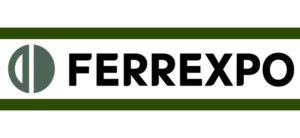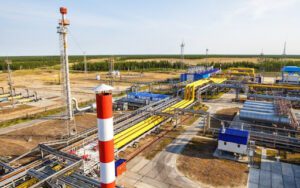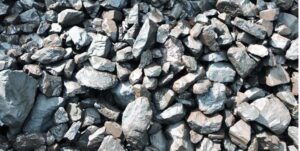
Ferrexpo plans to invest more than $2 million in educational equipment, Yuriy Arsenyev, the Director of Information Technology and Automation at Ferrexpo, said during the presentation of Ukraine’s first Privat Network using LTE technology at 5.7 GHz.“We are negotiating the purchase of simulation cabins and software with companies from South Africa and Australia,” he said.The mining simulator cab recreates the cab of a dump truck or excavator.“The technology allows you to simulate even choreography, the interaction of different pieces of equipment. That is, we can simulate the simultaneous operation of an excavator, a bulldozer and a dump truck,” he added.The technology studied by Ferrexpo allows you to scan real careers, load this data into the program and create a simulation that matches 100% real conditions.“Such tools make it possible to train personnel more efficiently. First of all, upon receipt of new equipment, we will be able to improve our qualifications in just a month, teach them how to work with it. The second point is that such simulators will allow us to work out emergency situations, for example, ice in a quarry,” Arsenyev said.One such complex for one type of equipment is about $1 million.“We are negotiating the purchase of three sets, for bulldozers, dump trucks and excavators. But we want to buy one base, a container with hydraulics, which costs about $500,000. Replacement control kits each cost the same. We want to take one base and several replacement kits,” the expert said.According to him, the conversion from one type of equipment to another takes about a day. “You can train personnel for one type of dump truck, re-equip in a day – and prepare for another,” he noted.

The United States will provide Ukraine with new funding to help diversify its energy resources, U.S. Secretary of State Antony Blinken has said.
“We are also discussing ways to ensure the security of energy supply to Ukraine. That includes providing new funding to help Ukraine diversify its energy resources, working with key allies and partners to bring to bear all available leverage and pressing for an extension of Ukraine’s gas transit agreement with Russia and supporting efforts of Ukraine to connect its electrical grid to Europe’s,” Blinken said at a press conference following a meeting of the United States-Ukraine Strategic Partnership Commission in Washington on Wednesday.

Canadian-based Tenaz Energy Corp. is interested in the implementation of projects for the development of hydrocarbon areas in Ukraine, head of the State Service of Geology and Subsoil of Ukraine Roman Opimakh said on Facebook after a meeting with executive director of the company Anthony Marino in Kyiv. “Special attention (on the part of Tenaz Energy Corp. is paid to the facilities, where production was suspended due to a sharp drop in the production rate of wells that are not being developed now,” Opimakh said with reference to Marino.In turn, the head of the service informed the representative of the Canadian company about the existing proposals in the field of hydrocarbon development in Ukraine, as well as about possible ways to implement business projects.“The service has prepared and published in the investment atlas of a subsoil user 50 objects with oil and gas deposits for electronic auction. This is more than 6,000 square kilometers throughout Ukraine, including areas with approved reserves and green fields,” Opimakh explained at the meeting.According to him, it is possible to obtain the right to explore and develop by purchasing special permits at electronic auctions, which the service regularly conducts on the ProZorro.Sale platform.He also informed the Canadian investor about the possibility of Tenaz Energy Corp.’s entering the existing farm-in subsoil use projects.“The condition is the acquisition of a share in the company that is the licensee. Such a mechanism may be of interest to enterprises that are experiencing difficulties in unlocking the full potential of the facilities, and the international partner will offer capital and experience,” Opimakh emphasized. Tenaz Energy Corp. is a public company specializing in the acquisition of oil and gas assets around the world through mergers and acquisitions in order to create an efficient extraction business. Tenaz Energy Corp. has carried out operations to acquire assets worth more than $ 6 billion and has experience of operating in 65 countries of the world. The company develops hydrocarbons in Central Alberta (Canada) and focuses on the markets of Europe, the Middle East, South America and North Africa.

Ukraine in January-October this year reduced imports of manganese ore and concentrate in quantity terms by 30% compared to the same period last year, to 337,278 tonnes.According to statistics released by the State Customs Service, in monetary terms, imports of manganese ore and concentrate decreased by 35.1% over the period, to $42.262 million.At the same time, manganese ore and concentrate were imported from Ghana (99.84% of supplies in monetary terms), Brazil (0.08%) and Belgium (0.07%). In January-October 2021, Ukraine exported 434 tonnes of manganese ore and concentrate to Poland (90.2%) and Russia (9.8%) for $51,000 (no ore was exported in August-October), while in the same period last year it exported 47,342 tonnes of manganese ore and concentrate for $7.152 million

The Arsenal insurance company (Odesa) in January-September 2021 collected UAH 11.063 million in net premiums, which is 19.4% more than in the same period in 2020.According to a company’s report, posted in the information disclosure system of the National Securities and Stock Market Commission, its gross premiums for this period increased by 31.7%, to UAH 14.624 million. Some UAH 3.715 million was transferred to reinsurance (more by 67.5%).Over nine months, the company paid UAH 330,000, which is almost 50% less than in the same period a year earlier.Company’s administrative expenses amounted to UAH 2.452 million (more by 7.8%), and sales expenses – UAH 908,000.Gross profit amounted to UAH 10.733 million (more by 24.2%), net profit UAH 7.503 million, while in the same period a year earlier it was UAH 7.732 million.As reported, in October 2021, Vostok Capital LLC (Kyiv) became a new shareholder of the company with a block of 80.741% of shares, the main shareholder of which is PrJSC Fozzy Group.Fozzy Group is one of the largest Ukrainian retailers with nearly 690 points of sale throughout the country. As of 2019, the total area of its stores exceeded 1 million square meters.
National bank of Ukraine’s official rates as of 11/11/21

Source: National Bank of Ukraine